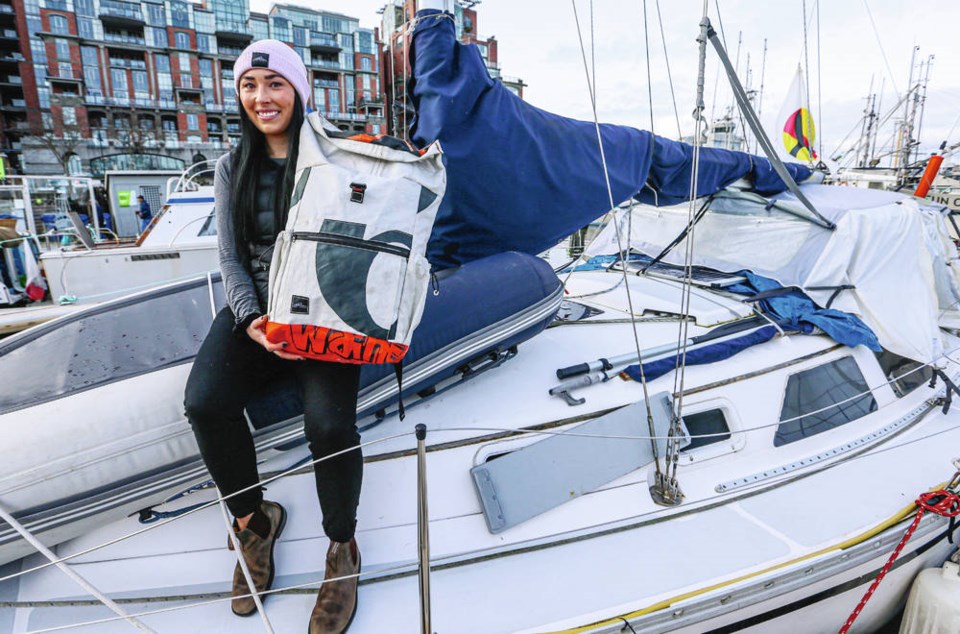When people talk about a circular economy in which materials get reused and less waste ends up in landfills, they’re really talking about entrepreneurs such as Meaghan McDonald.
The 31-year-old Victoria woman has launched a new venture that aims to make money and protect the environment at the same time.
Her brand, Salt Legacy, plans to give new life to discarded or “dead” sails from sailboats by using the durable, water- and sun-resistant materials to make backpacks, surfboard bags and other outdoor gear rather than burying all that nylon and polyester underground.
“I’ve always been really eco-conscious and always wanted to create something that would kind of help within the circular economy,” McDonald said.
She has a background in biology rather than business, so she got help from an eight-month incubator program run by Victoria’s Project Zero — a partnership between the non-profit Synergy Foundation and Vancity that assists start-up businesses looking to operate in a circular economy.
Project Zero envisions a Vancouver Island where, by 2040, “our waste will be our greatest resource” and hundreds of people will be working for small independent businesses that, like McDonald, will be “upcycling” materials into new products.
Municipal politicians are getting on board.
Victoria Coun. Jeremy Loveday describes the circular economy as an immense opportunity “to create good green jobs and live on this planet in a way that will actually be sustainable.”
That’s why he got Victoria council to endorse a resolution to the Union of B.C. Municipalities, calling on the provincial government to develop a circular-economy strategy.
Loveday said such a strategy would allow the province to encourage and mandate that governments, businesses and residents adopt circular-economy practices.
“And, I think, local governments are at the heart of it because cities are where the population, carbon emissions, waste and innovation are all occurring.”
His motion, which emerged from the Climate Caucus, a non-partisan network of more than 300 elected officials across Canada, received final approval from Victoria council on Thursday.
In a related move, council also backed Loveday’s resolution to the UBCM asking the province to adopt right-to-repair legislation, which would ensure citizens have access to the parts and information they need to fix items, rather than being discouraged by companies that claim ownership over the intellectual property of their products.
“The idea, essentially, is that it’s time for the era of planned obsolescence to be over, and that consumers should have the right to receive information about their products, have access to spare parts, and that we should be able to repair the things that we purchase, rather than having a product that is designed to have an end of life,” Loveday said.
Nanaimo Coun. Ben Geselbracht won approval from his council for similar motions last week, as well as a third resolution calling for a provincial strategy to deal with demolition and construction waste.
Geselbracht said that the more municipal councils sign on to the resolutions, the stronger the case for them receiving serious consideration at the next UBCM convention.
“Then, hopefully, when it gets passed to the minister, there’s a pretty clear mandate that this is an important issue and we really demand action on it.”
As for McDonald, she’s forging ahead with her business plans and collecting old sails from marinas and sailing clubs that are only too happy to donate materials destined for the landfill.
She has the prototype for her backpack complete, work is underway on a fanny pack and a surfboard bag is in the design stage.
McDonald is also gathering the history of each discarded sail, so that she can attach stories of adventure and world travel to her new products.
“Then the new consumer can kind of have a bit of that history and that connection piece to the backpack they just bought,” she said.
In that way, her products will keep stories circulating as well as the economy.
lkines@timescolonist.com



